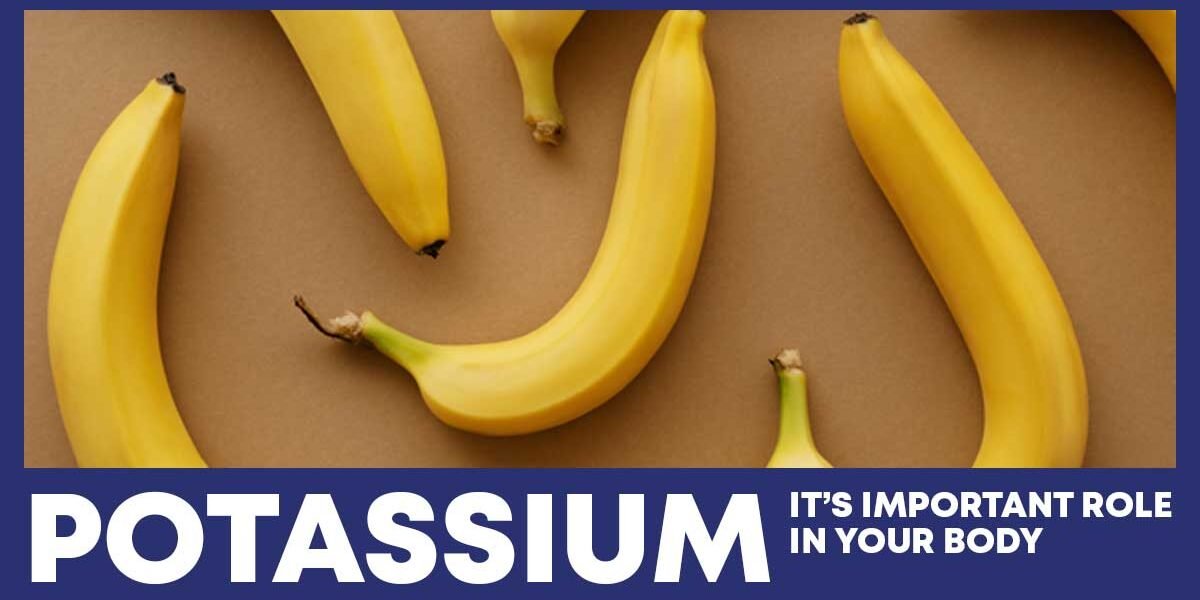Table of Contents
Discover why Potassium For Your Healthy Body. Learn about its role in energy production, muscle function, and overall health, and find out how to meet your daily potassium needs.
In today’s health-conscious world, understanding the vital nutrients that keep our bodies functioning optimally is more important than ever.
Among these essential nutrients, potassium stands out as a powerhouse mineral that plays a crucial role in maintaining overall health. From regulating fluid balance and muscle contractions to supporting nerve signals and heart function, potassium is indispensable for a healthy body.
In this article, we’ll delve into the importance of potassium, explore its numerous health benefits, and provide practical tips on how to ensure you meet your daily potassium needs. Whether you’re looking to boost your energy levels, improve muscle function, or enhance your overall well-being, understanding the role of potassium in your diet is key.
Why potassium is so important for your body

we’re gonna talk about why potassium is so important in to your body .
The more deficient you are in potassium , the more the pancreas has to pump out insulin .
So it puts a lot more stress on the pancreas .
And if you’re diabetic , this is not a good thing .
So potassium is the nutrient that is needed the most in the body .
You need close to 5 000 milligrams .
Potassium is a mineral , and you need large amounts of it .
It’s needed in almost every single cell , for energy because there’s a pump in the cell that generates energy .
And if you’re deficient in potassium , you are gonna be tired .
Potassium is also needed to make muscle protein .
It’s needed to make other types of protein as well .
It’s also used to store glucose as glycogen , which basically is a string of glucose molecules in a chain , but each molecule of glucose needs potassium .
And so all the cells have glycogen except the brain and the red blood cell .
And that’s why your brain is dependent on how much sugar is in blood .
| Category | Details |
|---|---|
| Role of Potassium | Potassium is an essential mineral and electrolyte that helps maintain fluid balance, nerve signals, and muscle contractions. It is vital for the proper functioning of cells, tissues, and organs. |
| Daily Requirement | The recommended daily intake of potassium varies by age and gender, but generally, adults need about 2,500-3,000 mg per day. |
| Symptoms of Low Potassium | – Muscle weakness and cramps – Fatigue – Irregular heartbeats – Constipation – Tingling or numbness – Nausea – Bloating |
| Causes of Low Potassium | – Poor dietary intake – Excessive loss through urine or digestive tract (diuretics, diarrhea, vomiting) – Excessive sweating – Chronic kidney disease – Medications – Conditions like diabetes |
| Benefits of Potassium | – Maintains proper cell function – Regulates muscle contractions – Supports heart health – Balances blood pressure – Reduces risk of stroke – Improves bone health – Enhances nervous system function |
| High Potassium Foods | – Bananas – Avocados – Leafy greens – Beans – Nuts – Seeds – Potatoes – Fish |
| Importance for Heart Health | Potassium helps regulate heartbeat and maintain normal blood pressure. It balances the effects of sodium, reducing the risk of hypertension and cardiovascular diseases. |
| Potential Risks of High Potassium | Excessive potassium intake can lead to hyperkalemia, causing irregular heartbeats, muscle weakness, and potentially fatal heart conditions. |
| Recommended Intake for Women | Adult women need about 2,500-2,900 mg of potassium daily, depending on age and health status. |
| Recommended Intake for Men | Adult men generally need about 3,000-3,400 mg of potassium daily, depending on age and health status. |
| Potassium Supplements | Potassium supplements should be taken under medical supervision to avoid hyperkalemia. It’s safer to get potassium from dietary sources. |
| Interplay with Sodium | Potassium and sodium work together to regulate fluid balance, muscle contractions, and nerve signals. A proper balance is crucial for overall health. |
Your brain needs enough sugar in your blood to function well

And if there’s not enough sugar in your blood , it will create , all sorts of symptoms like , fatigue and moodiness and , mainly kind of brain fog .
Now , junk food depletes potassium .
It’s very heavy on sodium , but very low on potassium .
Adrenal stress , which means high cortisol , will also deplete potassium .
The combination of both is not good .
Insulin resistance , which is a prediabetes , and diabetes will block your ability to absorb potassium because 1 of the functions of insulin is to help absorb potassium .
So if you have insulin resistance , you’re not going to absorb it .
So now you the requirement is even higher .
If you’re insulin resistant or diabetic, a potassium deficiency further harms your blood sugar

But by taking potassium , getting it from the diet , you can decrease the need for , insulin and help someone that has diabetes .
So if you’re insulin resistant or you’re diabetic and you’re not consuming enough potassium , you’re probably not gonna overcome the blood sugar situation .
So what’s the significance of this ?
It means that our bodies require a large quantity of vegetable , okay , to be healthy .
So if you’re a prediabetic or diabetic and you’re consuming maybe 1 cup of vegetable per day , that’s not gonna cut it .
And , also , if you’re taking a supplement that has 99 milligrams of potassium , it’s not gonna even come close .
For optimum potassium

You would have to consume about , what , 47 pills a day .
So because insulin is involved in so many problems health wise , to be healthy , you must consume minimally 7 cups to 10 cups of vegetables or salad every single day .
There’s just no shortcuts .
So so now you know what to do , so go ahead and do it .
Key Points:
- The more deficient you are in potassium, the more your pancreas has to pump out insulin. This puts more stress on your pancreas. If you have diabetes, that’s not good.
- Your body needs potassium more than any other nutrient. Your body needs close to 5,000 mg per day of this mineral. Almost every cell needs it for energy. Your cells have pumps that put out energy. Without enough potassium, the pumps don’t function correctly and you feel tired.
- You need potassium to make muscle protein, and other kinds of protein too. Potassium is used to store glucose in the form of glycogen, a chain of glucose molecules. Each link in this chain needs potassium. All of your cells except your brain and red blood cells have glycogen. Your brain is dependent on the sugar in your blood. Without enough, you experience fatigue, moodiness, and brain fog.
- Junk food depletes potassium because of its high sodium content. Adrenal stress, which results in high cortisol, also depletes potassium. Insulin resistance and diabetes block your ability to absorb potassium. By consuming enough potassium in your diet, you can decrease your need for insulin, and help correct your blood sugar issues.
- You need to consume large quantities of vegetables in order to get enough potassium and help regulate your insulin. Each day, you must consume seven to ten cups of vegetables. There is no shortcut. You require so much potassium that taking supplements isn’t feasible.
DATA:
https://ods.od.nih.gov/factsheets/Potassium-HealthProfessional
FAQ:
Why is potassium important to the body?
Potassium is crucial for maintaining proper cell function, fluid balance, and nerve signals. It helps regulate muscle contractions, including the heart, and plays a vital role in maintaining normal blood pressure by balancing the effects of sodium.
What happens when your potassium is low?
When potassium levels are low (a condition called hypokalemia), it can lead to:
- Muscle weakness and cramps
-Fatigue - Irregular heartbeats
- Constipation
- Tingling or numbness
Severe hypokalemia can cause life-threatening heart conditions.
What does high potassium do for the body?
High potassium levels (hyperkalemia) can have beneficial effects such as:
-Lowering blood pressure
- Reducing the risk of stroke
- Decreasing the likelihood of kidney stones
However, excessively high potassium levels can be dangerous and may lead to heart problems.
Why is potassium of primary importance to the human body?
Potassium is of primary importance because it:
- Maintains proper electrical activity of the heart
-Supports muscle function - Aids in nutrient transport into cells
- Balances fluids in the body
- Helps nerves function correctly
What are the 5 benefits of potassium?
- Regulates Fluid Balance: Helps with hydration and electrolyte balance.
- Supports Muscle Function: Essential for muscle contractions and preventing cramps.
- Maintains Heart Health: Regulates heartbeat and blood pressure.
- Promotes Bone Health: Reduces calcium loss, supporting bone density.
- Enhances Nervous System: Facilitates nerve signal transmission.
Which food is highest in potassium?
The food highest in potassium is the Avocado, which contains about 975 mg of potassium per medium avocado. Other high-potassium foods include bananas, sweet potatoes, spinach, and beans.
Why is potassium important for the heart?
Potassium is important for the heart because it helps regulate heartbeat and maintain normal blood pressure. It balances the effects of sodium, reducing the risk of hypertension and cardiovascular diseases.
Potassium benefits for skin
Potassium helps maintain skin hydration and elasticity. It supports the function of cells and tissues, reducing the risk of dry skin and improving overall skin health.
Function of sodium and potassium in the human body
Sodium and potassium work together to:
- Regulate fluid balance
- Maintain nerve function
-Control muscle contractions
-Balance blood pressure
Sodium is primarily outside cells, while potassium is inside, creating an electrochemical gradient essential for cell function.
How much potassium does a woman need daily?
The recommended daily intake of potassium for an adult woman is about 2,600-2,900 mg, depending on age and health status.
Potassium benefits for males
Potassium benefits males by:
-Supporting muscle function and recovery
- Maintaining normal blood pressure
- Reducing the risk of stroke
-Enhancing heart health - Improving bone density
Dangers of potassium supplements
Potassium supplements can be dangerous if taken in excess, leading to hyperkalemia. This condition can cause:
- Irregular heartbeats
- Muscle weakness
- Nausea
- Potentially fatal heart conditions
Always consult a healthcare provider before starting potassium supplements.




